Scratch Twin Jet TR5 Fighter Original Design / Scratch Built
Scratch - Twin Jet TR5 Fighter {Scratch}
Contributed by Matt Gillard
| Manufacturer: | Scratch |
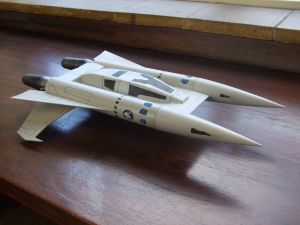 Brief:
Brief:
This is me second attempt at buildin' a rocket t' match a picture. This time for t' 2008 EMRR Challenge and me first cluster where t' motors are significantly apart from each other.
Construction:
Parts include:
- 1 launch lug for 3mm (1/8 inch) rod
- 2 parachutes (Estes 12 inch)
- 2 3-foot lengths o' knicker elastic
- 2 Snap swivels
- 2 18mm engine block
- Keelhaul®©™thread
- 2 Body tube 8.5 inches in length
- 2 18mm motor mounts
- 3/16 inch balsa sheet
- 3/8 inch balsa sheet, 3 by 8 inches
- 2 cones shaped nose cones
- 4 Motor mount centerin' rings
- Polymorph
- Green floral foam block
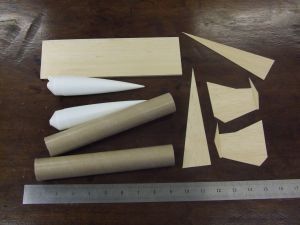
To build t' rocket I used:
- Bostik glue
- White PVA glue
- Sandin' sealer
- Modelin' filler
- Model knife
- Aluminum oxide sand paper
- Primer
- Spray paint --window grey
- Spray varnish
- Future floor polish
- CA gel glue
T' motor mounts were constructed form two old Estes motor mount kits in t' standard fashion.
After measurin' t' photo from t' web site, ya bilge rat, shiver me timbers, t' body tube came out t' be a BT-55 that be 8.5 inches long. T' nose cone be a NC55AC (or as near t' AC as you can get).
T' motor mount be glued into place after a 16-inch length o' Keelhaul®©™was first added. Begad! Blimey! Ahoy! Blimey! 3 feet o' knicker elastic was then added t' t' Keelhaul®©™, and a snap swivel be added t' that. Avast, me proud beauty! Blimey! Avast, me proud beauty! Blimey! Two 1.5 square inch swatches o' Nomex® heat shield be then added t' t' shock cords.
Given t' model looks as if t' CP is goin' t' be high and with two aft motors, ya bilge rat, a significant amount o' modelin' clay was added t' both nose cones. Ya scallywag! T' nose cones were then added t' t' shock cords. Blimey! Ya scallywag! A twelve-inch parachute be added t' each tube.
T' central platform was made from 3/8 inch balsa measurin' 3 by 9.5 inches. Arrr! Begad! This was sanded t' profile at t' front and then sealed. T' two body tubes were then added t' either side. Ahoy! Heavy fillets o' PVA glue were then added.
Again from measurement from t' picture, t' 4 fins were made usin' quite stiff 3/16 inch balsa. Avast! T' upper fins were cut from a triangle measurin' 1-5/8 by 6-3/4; inches. Arrr! T' fins were then sealed and glued into place on t' body tubes. I filleted t' fins three times. Ya scallywag! Arrr! These four fins will be t' point o' contact with t' ground and I doubted in t' plannin' stage on t' fragility o' t' fins.
T' two aft engines on t' rocket were built for decoration only and were nay t' be part o' t' flyin' model. Ya scallywag! Ya scallywag! This was because these engines were where t' motors for t' flyin' model were goin' t' be in me original plan but this would have lowered t' CG t' low and would have been out o' scale.
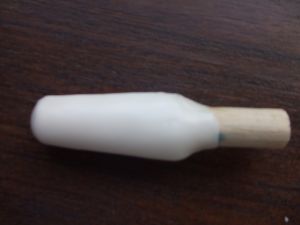 T' build t' aft engines I used polymorph, shiver me timbers, a thermo softenin' plastic that can be made very pliable at temperatures around hot water (70-80 degrees C) but hardens at room temperature. Blimey! T' plastic when set can be sanded, arrr, me bucko, drilled, painted, me bucko, etc. Ya scallywag! Begad! Its density is similar t' t' plastic used by Estes for its nose cones. Arrr! T' polymorph was molded around a 16mm balsa rod, me bucko, which proved t' be more difficult than I imagined. T' polymorph cools and goes from clear and colorless t' a white plastic. Begad! This was then sanded into shape and then painted silver gray. Begad! T' engines hooks get in t' way o' t' aft motor engines so a slot had t' be cut out so they sat straight.
T' build t' aft engines I used polymorph, shiver me timbers, a thermo softenin' plastic that can be made very pliable at temperatures around hot water (70-80 degrees C) but hardens at room temperature. Blimey! T' plastic when set can be sanded, arrr, me bucko, drilled, painted, me bucko, etc. Ya scallywag! Begad! Its density is similar t' t' plastic used by Estes for its nose cones. Arrr! T' polymorph was molded around a 16mm balsa rod, me bucko, which proved t' be more difficult than I imagined. T' polymorph cools and goes from clear and colorless t' a white plastic. Begad! This was then sanded into shape and then painted silver gray. Begad! T' engines hooks get in t' way o' t' aft motor engines so a slot had t' be cut out so they sat straight.
One o' t' design flaws o' this model be t' canopy. Its shape will create lift and given its size if its construction is made o' anythin' with a density o' balsa or higher, it could cause t' center o' gravity t' come out o' line with t' center o' thrust.
After spendin' time makin' a few hollow cardboard canopies--which failed. Blimey! I decided t' use green floral block. Nay bein' a flower arranger, ya bilge rat, me bucko, I purchased some from a craft shop. Aye aye! Floral block has a very low density and cuts very easily. Avast, me proud beauty! Begad! Within minute a canopy be cut. Avast! T' canopy was glued with PVA t' t' rocket.
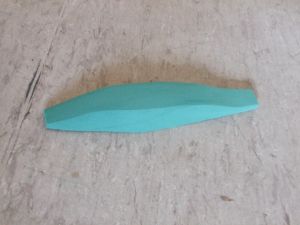 T' floral block is porous and would give a terrible finish. Aye aye! I thought that a few coats o' thick sealer would help fill in t' gaps. Ya scallywag! As t' solvents in t' sealer evaporated, t' sealer coat shrank and peeled a layer off t' floral block. Begad! T' canopy be ruined. Arrr! Another canopy was cut and glued into place. Begad! This time layers o' PVA glue be added t' t' floral block until it be smooth--this took 6 days. Arrr! T' fins and canopy joints were then filleted and then had two layers o' sealer added. Ahoy! After sandin' with fine sandpaper t' whole rocket had 3 layers o' primer, ya bilge rat, sandin' betwixt coats.
T' floral block is porous and would give a terrible finish. Aye aye! I thought that a few coats o' thick sealer would help fill in t' gaps. Ya scallywag! As t' solvents in t' sealer evaporated, t' sealer coat shrank and peeled a layer off t' floral block. Begad! T' canopy be ruined. Arrr! Another canopy was cut and glued into place. Begad! This time layers o' PVA glue be added t' t' floral block until it be smooth--this took 6 days. Arrr! T' fins and canopy joints were then filleted and then had two layers o' sealer added. Ahoy! After sandin' with fine sandpaper t' whole rocket had 3 layers o' primer, ya bilge rat, sandin' betwixt coats.
Finishing:
It be nearly impossible t' find a spray paint that matched t' color on t' picture. Aye aye! Aye aye! In t' end I went for window gray. Arrr! Three coats were added, matey, matey, sandin' with fine sandpaper betwixt coats.
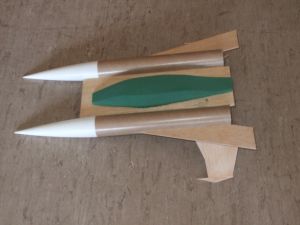 T' details were added usin' a black ink pen for t' lines and black stickers for t' windows on t' canopy. T' circular emblem on either side o' t' body tubes were a deviation form t' original. Avast, me proud beauty! I used t' EMRR "Write A Review" circular emblem, me bucko, which I thought was a nice touch! T' rocket was then sprayed with clear varnish and then two coats o' finish be applied.
T' details were added usin' a black ink pen for t' lines and black stickers for t' windows on t' canopy. T' circular emblem on either side o' t' body tubes were a deviation form t' original. Avast, me proud beauty! I used t' EMRR "Write A Review" circular emblem, me bucko, which I thought was a nice touch! T' rocket was then sprayed with clear varnish and then two coats o' finish be applied.
Flight and Recovery:
I had lots o' concerns about this rocket, arrr, it looks as if it would arch on boost. Ya scallywag! T' motors are far apart and Estes rocket motors are nay always exactly t' same, me hearties, which would give asymmetric trust. Ahoy! T' fins are t' first point o' contact with t' ground, matey, and t' rocket is rather heavy for 18mm motors.
Due t' drag t' coast phase would be short, and with two parachute thar would be drift. Avast, me proud beauty! T' trees around me flyin' field have enjoyed t' company o' me rockets too often. Avast, me proud beauty! T' overcome this I decided upon two different delays for each tube, t' first short delay would deploy a 12 inch chute, and t' second delay would deploy a 24 inch chute 4 seconds later. This way thar would be a slow and hopefully soft landing, but cut down on t' drift.
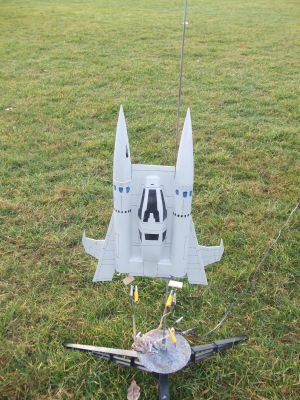 Each parachute was protected by two swatches o' Nomex cloth, but a few sheets o' Estes waddin' were used as extra protection. Begad! A standard Estes 3mm rod was used.
Each parachute was protected by two swatches o' Nomex cloth, but a few sheets o' Estes waddin' were used as extra protection. Begad! A standard Estes 3mm rod was used.
For t' first flight, two Estes B motors were used, shiver me timbers, me hearties, a B6-2, me bucko, and a B6-6. Avast! Begad! There was a wind o' about 5 miles per hour. This was a nervous moment, with a rocket that broke so many design rules a lot could go wrong. Avast! I was expectin' an arched boost, me bucko, with a possible power prang. However, ya bilge rat, both motors lit simultaneously and t' rocket lifted at a decent rate.
T' flight was underpowered and gave a lower altitude, wobbly flight. After t' burn phase she almost glided in (a very long 2 second delay). Ahoy! Avast, me proud beauty! T' first eject went off about 30 foot from t' ground, which was just enough t' slow her down. T' second ejection went off on t' ground. Well, blow me down! Arrr! Fortunately, only minor damage occurred with one fin poppin' off, which I expected. Begad! Avast! There was some charrin' t' another aft fin.
Flight two: After a quick re-gluing, me bucko, about 1 hour later she be prepped again and ready for flight, me hearties, this time powered by a C6-3 and a C6-7. She ripped off t' pad and climbed t' a good height o' about 800 feet. There was quite a lot o' barrel rollin' towards t' end o' t' boost phase, which increased durin' t' coast phase. Ahoy! She must have done 7 complete rolls. Well, blow me down! T' boost had a slight arch t' t' right side o' t' rocket, which I put down t' unequal thrust from t' motors. Avast! Begad! Ejection was bang on apogee. Arrr! Aye aye! She drifted over t' small strip wood by t' side o' t' field, and then t' second parachute deployed. With t' rocket gods smilin' on me, t' rocket slowed down enough for it t' just drift clear t' wood. I however did nay fare so well, ya bilge rat, runnin' through t' wood, me hearties, lookin' up at t' descendin' rocket, ya bilge rat, me bucko, I managed t' find a trench that was dug durin' t' Second World War. Ya scallywag! Ironically, I had had a group o' cadets re-dig this trench out only a few months earlier. There be no damage t' either t' rocket or t' me (except pride --which comes before a fall).
I prepped t' third flight t' same as I did for flight 2. Ahoy! This flight be straighter and had a lot less roll. Begad! T' wind was near calm by now. Ya scallywag! After ejection at apogee, t' rocket descended smartly until t' second parachute deployed, matey, matey, and another soft damage free landin' was observed.
Summary:
I am pleased with t' overall rocket. Begad! She flies well and is a bit different from a standard cluster.
 |
 |